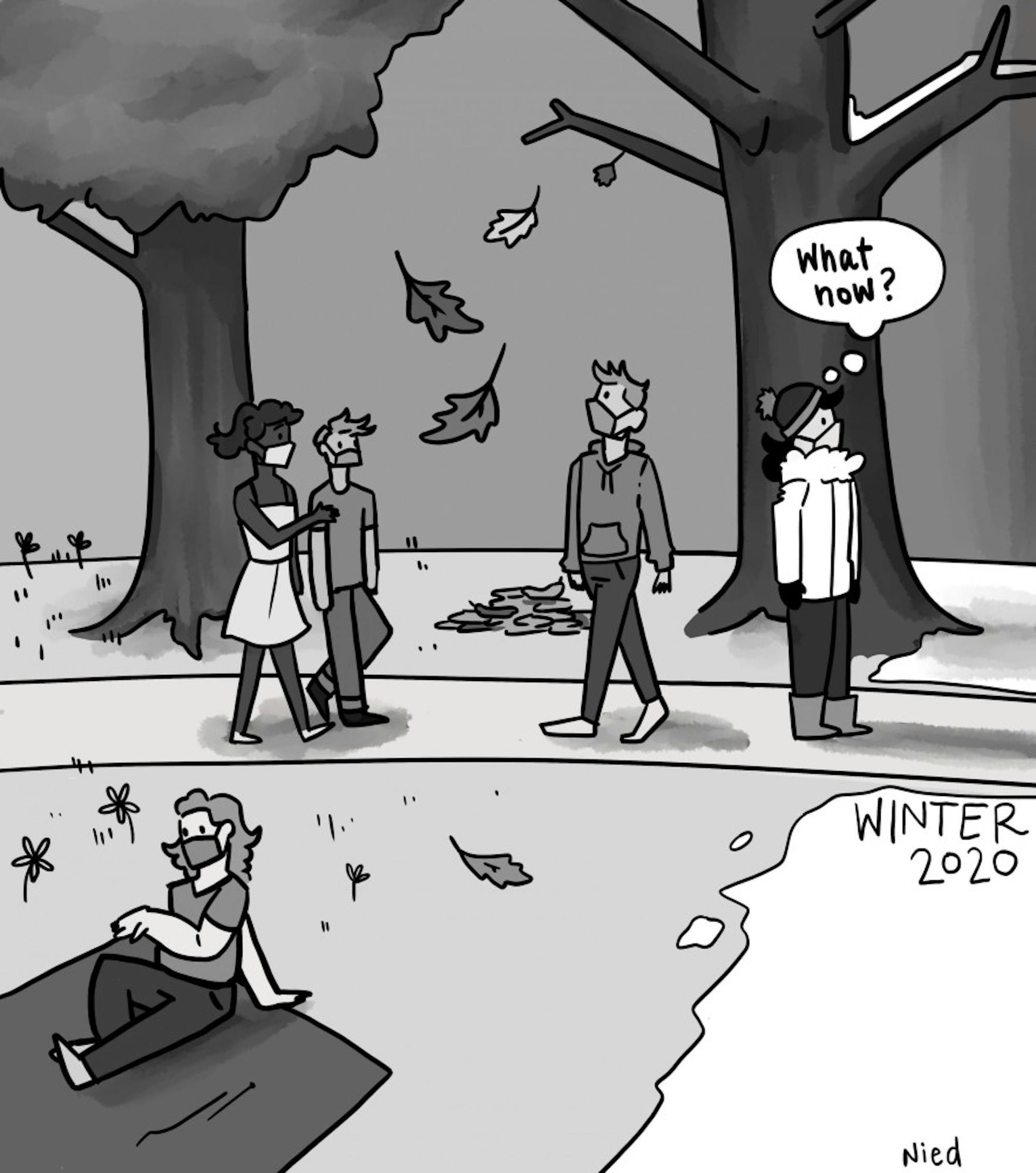A significant challenge of reopening any college campus during the pandemic is finding an appropriate balance between implementing health and safety measures and still allowing students to socialize. Thus far, Tufts has arguably succeeded in finding this balance; even with relaxed social distancing requirements withinresidential cohorts, opening campus spaces andin-person events, Tufts has maintained an exemplary seven-day unique-individual positivity rate of 0.02% as of Oct. 25.
But a New England winter is approaching, and with it fewer opportunities to socialize. As temperatures drop and daylight disappears, students will be left with limited options to safely congregate outdoors. In tandem with the recent classification of Somerville as a“higher risk”zone for COVID-19 and the impending flu season, this renders it even more critical that Tufts provides students with options to safely socialize this winter.
In warmer months, distanced options to socialize are much more accessible.This fall, Tufts encouraged outdoor social distancing by scattering Adirondack chairs across campus and providing students with blankets. As the gathering of students on the President’s Lawn and the Academic Quad in the early weeks of the semester demonstrated, this was a widely-used and effective way of socializing while still distant. But without ways to gather outside in the colder months, this will change, as students and community members will turn to socializing and eating indoors. To sustain recent progress containing the spread of COVID-19, Tufts must provide students with more options to socialize as winter nears.
Furthermore, as a result of Tufts’decision to keep campus open after Thanksgiving,many students may stay on campus for the remainder of the semester. For these students, it may mean forgoing spending the holidays with family, an isolating reality of the pandemic. On top of providing options for students to socialize in the cold, Tufts must also organize socially distant gatherings and events for those who are away from home for the holidays.
First, Tufts should pursue options that make outdoor spaces habitable during the cold winter months. As Tufts Community Union (TCU) President Sarah Wienersuggested in a TCU meeting last week,Tufts should invest in outdoor lighting fixtures, such as string lights, to light up outdoor spaces and encourage students to spend time outdoors at night. Tufts should also look into implementing space heaters and heated benches in outdoor spaces to offer warm, socially distant areas to gather. Lastly, Tufts should consider constructing temporary covered spaces, such as weather-resistant canopies, where students can gather no matter the weather. This is an option plenty of Boston restaurants have alreadypursued to allow for warm outdoor dining. In places like Tisch Roof and the President’s Lawn, these additions would effectively encourage safe habits for socializing during the winter.
Another option to consider is opening more indoor, socially distant spaces to meet. Currently, the Mayer Campus Center is a good example of an open, safely distanced space for students to study and catch up with others. Tufts should replicate this set-up in other open spaces, such as the Remis Sculpture Court in the Aidekman Arts Center. While students are allowed to reserve study spaces to work in, there should be more accessible ways for students to socialize indoors.
As outdoor opportunities to socialize become limited, students must also remain diligent in following campus guidelines and health protocols. This includes gettingvaccinated for the flu before Nov. 19 and only relaxing social distancing requirements when within residential cohorts. However, following health guidelines will be particularly difficult during winter months if alternatives are not promptly put in place by the university.
The new challenges posed by this upcoming winter remind us that Tufts’ success may not necessarily be permanent. As the year progresses, Tufts must dynamically find solutions to the everchanging problems presented by the pandemic, including the inevitable challenges of socializing in cold weather. Doing so will establish Tufts’ long-term resiliency as a hybrid campus moving forward.






